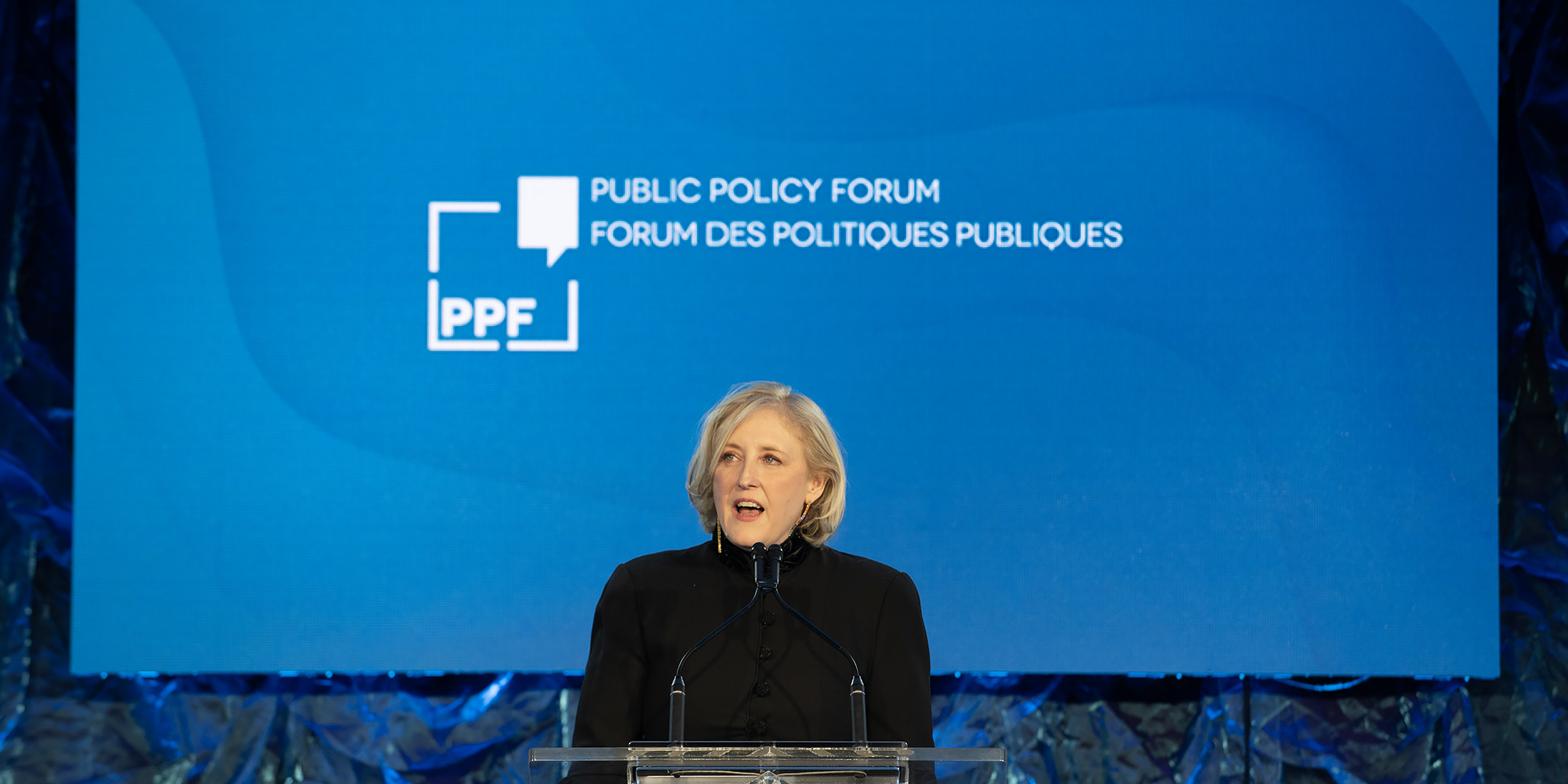
Hon. Lisa Raitt: The three broad buckets of public policy

Thank you, Yolande. I really don’t think I heard the words public policy used in a sentence until law school. It certainly was nothing that I grew up with in Whitney Pier. And as I reflected on this honour in preparing for tonight, I found myself defining my relationship with public policy in three broad buckets, three phases. At times I was a taker of public policy. For a period of time, I was humbled to be a maker of public policy. And today, I find myself aspiring to continue to be a shaper of public policy.
Also see: Lisa Raitt: ‘Growth in Canada has been so anemic’
Now on taker, I’ve seen good and bad in being on the receiving end of public policy. In 1978, in the province of Nova Scotia, there was a program to allow low-income households to make urgent repairs to their premises. We got new windows and it was like we had won the lottery. Now, it was a repayable loan, so eventually the grumbling did start to happen in terms of having to pay back the government, but nonetheless, a burden or a load had been removed from my grandparents and their lives for better for it. Good public policy makes people’s lives better. But to contrast, as Yolande talked about, in 2004, it was a Friday afternoon about four o’clock, and I got a call from the government switchboard asking me to hold for Louis Ranger, who is the then-deputy minister of transport. Getting a call on Friday afternoon at four o’clock from a government department is not a good sign, ladies and gentlemen. Louis informed me that cabinet had just passed a regulation prohibiting anyone from building a fixed link from the shore of Toronto to Toronto Island. Now, let’s face it, there really was only one entity that was seeking to build a fixed link from the Toronto shore to the Toronto Island. That was the Toronto Port Authority and I was the president and CEO at the time. And this regulation was a little bit awkward for us because we had already let the contracts for construction and we had a start-up airline ready to start flying by the name of Porter. Now, through one’s eyes, you could say that the killing of this fixed link would have appeared to have been good public policy. But in my case, it wasn’t so great. Ironically, being served that dose of public policy is what actually propelled me into politics and eventually into cabinet where I became a policymaker.
Being a policymaker is an honour, it’s a responsibility, it’s to be taken seriously, and it’s a power that should not be frittered away. When you can make things better, you must. Two impactful pieces of public policy during my time really stand out for me. The first was the complex and multifaceted policy response to the Lac-Mégantic disaster that started in 2013 and really spanned my entire term as minister of Transport. I worked with a dedicated and a caring team of officials and staff at Transport Canada, who understood that we needed to move surely and swiftly. And it’s really hard to believe it’s been 10 years since then. The second piece of public policy was the National Standard of Canada for Psychological Health and Safety in the Workplace. There I found myself working with the Mental Health Commission of Canada and with Bell Canada on something that made Canada the first nation in the world to recognize and implement. Public policy collaboration with a private-sector player leading the charge. Good public policy making a difference in people’s lives.
Now, having been liberated from Parliament in 2019, I have evolved into the role of wanting to shape public policy. At CIBC Capital Markets, I work in the energy transition space with a fantastic team and I am hyper-focused on helping clear a path for Indigenous access to capital for major projects. Through the Coalition for a Better Future, supported by Compass Rose, with my awesome co-chair, Anne McClellan, we’ve embarked on a cross-partisan approach to keeping long-term economic growth – that is inclusive and sustainable – at the top of the Canadian agenda.
And personally, as mentioned, with the prior informed blessing of my husband, Bruce Wood, my family has shared with Canada what it is like to receive a diagnosis of young-onset Alzheimer’s and what life looks like after that – from denial, to acceptance, to anger; from loss of job, to loss of memory, to loss of speech, to loss of movement, and eventually to loss of life. John Baird asked me once, ‘Raitts, why do you share so much?’ And the reality is that I know from working in public policy that the problem has to be seen and it has to be felt before solutions can be had. And if we could start, well then, maybe others would follow.
Now, finally, I am most grateful for my greatest projects, which are my sons, John Colin and Billy, because they have also heard the call of informing public policy discussions. JC speaks on the topic of youth caregivers in Alzheimer’s family members. And Billy, here tonight, has designed a logo called Alzheimer’s Strong and developed a clothing line to raise awareness and change the trajectory of Alzheimer’s disease. And I should tell you that he probably has a box of those T-shirts in my car available in the parking lot later for you to purchase. My sons have become public policy shapers, and that’s the greatest accomplishment that I could have. Thank you, Public Policy Forum, for adding me to your honour roll, and thank you for all of you tonight for what you do to make good public policy and our country so much better. Thank you.


